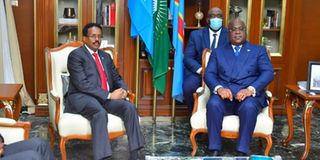Premium
Somalia crisis: Mohamed Farmaajo accepts AU mediation

Somali President Mohamed Farmaajo (left) and his DR Congo counterpart Félix Tshisekedi in Kinshasa on April 20, 2021.
Somalia’s President Mohamed Farmaajo on Monday accepted the intervention of the African Union (AU) in the dispute over elections in his country.
This apparent admission of the continental body’s help will, however, be accepted as long as Somalia retains its sovereignty.
President Farmaajo, who arrived in Kinshasa for an official visit on Monday, met DR Congo President Félix Tshisekedi, who is also the AU chairman, for two hours.
During the meeting, he briefed President Tshisekedi on the political and security situation in Somalia.
“President Mohamed Abdullahi Mohamed particularly insisted that the African Union and chairman should play a leading role to facilitate and frame the negotiations and the dialogue between all the Somali stakeholders,” a dispatch from the Presidential Palace in Kinshasa said.
Under pressure
It noted that the African Union desires “to reach an agreement between Somalis for the good of the Somalis.”
President Tshisekedi welcomed the Somali president’s willingness, in the spirit of African solidarity, to confide in him as current President of the African Union in accordance with the relevant provisions of the AU Charter.
President Farmaajo’s trip came as pressure mounted on him to quell the tension that arose last week after the Lower House of Parliament voted to extend its mandate and that of the president by two years.
He had initially argued the Lower House had performed its legal duty of legislating. He accused the external partners of interference and vowed to stand by the decision of Parliament.
But the African Union whose combat force, Amisom, is still guarding key installations in Somalia; the European Union which pays Amisom soldiers, the UK and US both of who give substantial security support and the UN; all rejected the extension.
Prepare for polls
Mr Farmaajo argued there had been no extension, saying that Parliament had merely delayed elections to allow time for preparations for universal suffrage.
From Saturday, however, he started speaking to key partners including the US, UN and the UK. He is seeking support for the extension, which he hopes will create a better environment to prepare for polls. His rivals have, however, rejected the extension and threatened a parallel process, which donors have warned they will reject as well.
“In their discussions, President Farmaajo talked about the need to encourage African solutions to African problems and as such he has indicated his government’s willingness to see the African Union take a leading role in the facilitation of engagement process that will lead to dialogue among Somali stakeholders,” said Mohamed Abdirizak, Somalia’s Foreign and International Cooperation Minister.
“The issue of political transition in Somalia is an internal issue,” Mr Abdirizak added.
Speaking to the press, the two heads of state said they had discussed bilateral relations. Mr Farmaajo returned to his country on Monday afternoon, confident that the AU will do everything possible to reconcile the Somali parties.





